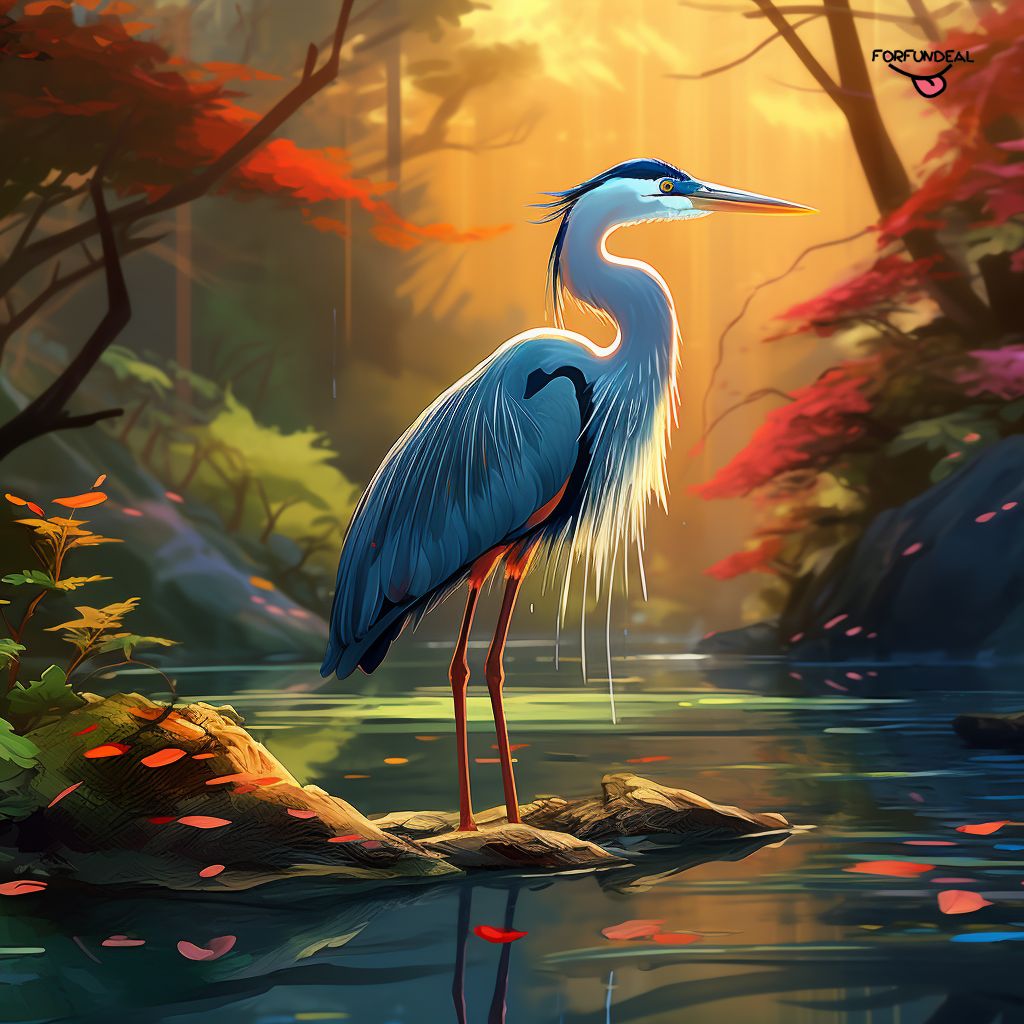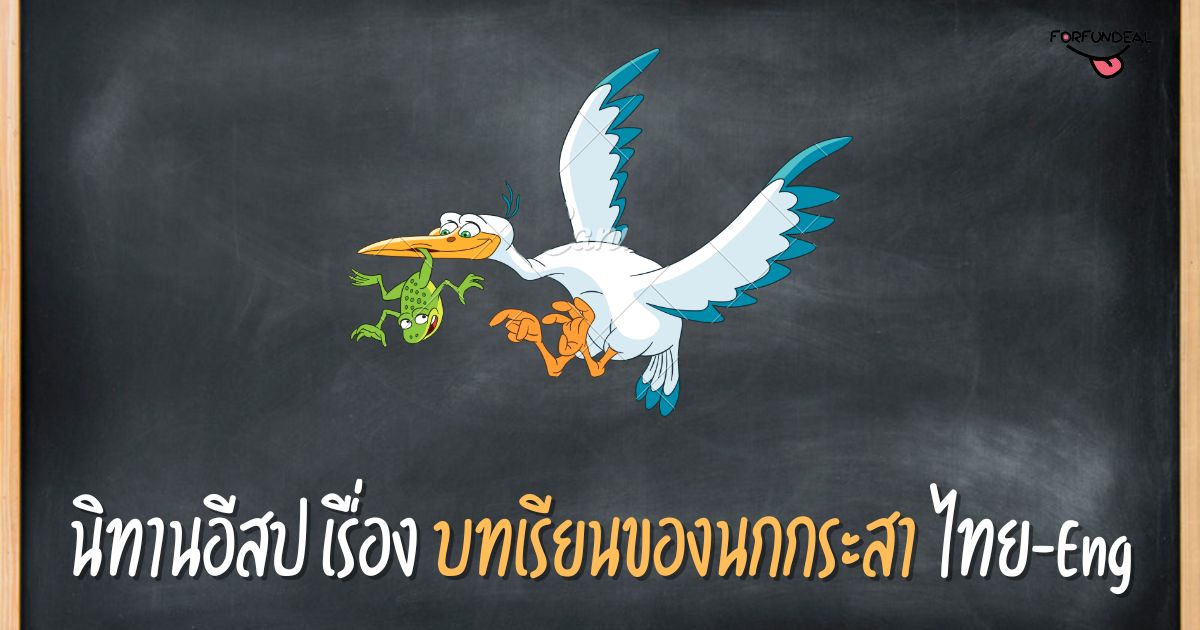“บทเรียนของนกกระสา” เป็นนิทานอีสปที่สอนเราถึงการยอมรับตัวตนตัวเอง และการยอมรับผู้อื่น อย่าพยายามเป็นสิ่งที่ตัวเองไม่ได้เป็น เพราะทุกคนมีจุดแข็งจุดอ่อนที่แตกต่างกัน
นิทานอีสปเรื่องบทเรียนของนกกระสา
กาลครั้งหนึ่งนานมาแล้ว มีนกกระสาผู้สง่างามตัวหนึ่งอาศัยอยู่ริมสระน้ำ นกกระสาขึ้นชื่อเรื่องขายาวและจะงอยปากแหลมคม ซึ่งทำให้จับปลาได้ง่าย ทุกวัน นกกระสาจะยืนอย่างอดทนในน้ำตื้น รอปลาว่ายผ่านไป
Once upon a time, there was a graceful Heron that lived by the edge of a pond. The Heron was known for its long legs and sharp beak, which enabled it to catch fish with ease. Every day, the Heron would stand patiently in the shallow water, waiting for fish to swim by.
อยู่มาวันหนึ่ง ปูที่หิวโหยกลุ่มหนึ่งสังเกตเห็นการตกปลาที่ประสบความสำเร็จของนกกระสาและเริ่มอิจฉา พวกเขาเข้าไปใกล้นกกระสาและพูดว่า “เจ้าโชคดีมากที่มีฝีมือในการจับปลาที่ยอดเยี่ยม พวกข้าติดอยู่กับการเดินบนบกและค้นหาเศษอาหาร เจ้าช่วยสอนพวกข้าจับปลาแบบเจ้าได้ไหม”
One day, a group of hungry Crabs noticed the Heron’s successful fishing expeditions and became envious. They approached the Heron and said, “You’re so lucky to have such a great skill for catching fish. We are stuck crawling on the land and searching for scraps. Can you teach us how to fish like you?”
นกกระสารู้สึกเหนือกว่าจึงตกลงสอนปู อย่างไรก็ตาม แทนที่จะสอนศิลปะการตกปลาให้พวกเขา นกกระสากลับพาปูไปยังพื้นที่ทรายที่แห้งและห่างไกลจากสระน้ำ พวกปูพยายามดิ้นรนเพื่อเคลื่อนที่ไปในภูมิประเทศที่ไม่คุ้นเคย ความพยายามของพวกมันไร้ผล
The Heron, feeling a sense of superiority, agreed to teach the Crabs. However, instead of teaching them the art of fishing, the Heron led the Crabs to a dry, sandy area far away from the pond. The Crabs struggled to move in the unfamiliar terrain, their efforts in vain.
ฝูงปูทั้งสับสนและหงุดหงิดจึงถามนกกระสาว่า “พาเรามาทำไม นี่ไม่ใช่สระน้ำ และเราตกปลาที่นี่ไม่ได้!” นกกระสาตอบอย่างยิ้มๆ ว่า “เจ้าปูโง่เขลา ข้าสอนเจ้าเป็นนกไม่ได้ เจ้าควรเดินบนบก ไม่ใช่จับปลาในน้ำ”
Confused and frustrated, the Crabs asked the Heron, “Why have you brought us here? This is not the pond, and we can’t fish here!” The Heron responded smugly, “You foolish Crabs! I cannot teach you how to be a bird. You are meant to crawl on land, not fish in the water.”
พวกปูตระหนักว่าพวกมันถูกหลอกโดยคำสัญญาที่ผิดของนกกระสา พวกมันกลับสู่ถิ่นที่อยู่ตามธรรมชาติโดยยอมรับว่าสิ่งมีชีวิตแต่ละชนิดมีจุดแข็งและความสามารถเฉพาะตัว นกกระสายังคงเติบโตต่อไปในฐานะนักจับปลาที่มีทักษะ ในขณะที่ปูยอมรับความสามารถในการเดินและใช้ชีวิตบนบก
The Crabs realized they had been deceived by the Heron’s false promise. They returned to their natural habitat, acknowledging that each creature has its own unique strengths and abilities. The Heron continued to thrive as a skilled fisherman, while the Crabs embraced their ability to crawl on land.

นิทานเรื่องนี้สอนให้รู้ว่า
“สิ่งมีชีวิตทุกชนิดมีจุดแข็งที่เป็นเอกลักษณ์ สิ่งสำคัญคือต้องชื่นชมและเลี้ยงดูพวกเขาแทนที่จะพยายามเลียนแบบผู้อื่น จงพอใจกับความสามารถของตนเอง”
- ยอมรับจุดแข็งของตัวเอง สิ่งมีชีวิตแต่ละตัวมีความสามารถและพรสวรรค์เฉพาะตัว เรื่องราวนี้เตือนใจให้เรายอมรับความแข็งแกร่งของตนเองและไม่อิจฉาผู้อื่น การพยายามเลียนแบบทักษะหรือลักษณะของคนอื่นอาจนำไปสู่ความผิดหวังและความคับข้องใจ ให้เน้นไปที่การพัฒนาและใช้ความสามารถของตนเองแทน
- ระวังคำสัญญาที่ผิดพลาด พวกปูถูกล่อโดยนกกระสาที่สัญญาว่าจะสอนวิธีจับปลา แต่กลับถูกชักจูงให้หลงทาง นิทานเรื่องนี้สอนเราให้ระวังคำสัญญาที่ผิดๆ และอย่าไว้ใจคนอื่นโดยไม่พิจารณาเจตนาและความน่าเชื่อถือของพวกเขา กระตุ้นให้เราใช้วิจารณญาณและการคิดเชิงวิพากษ์
- การยอมรับและการตระหนักรู้ในตนเอง ปูตระหนักว่าที่อยู่อาศัยตามธรรมชาติและทักษะของพวกมันแตกต่างจากนกกระสา พวกมันยอมรับข้อจำกัดและยอมรับในความสามารถเฉพาะตัวของพวกเขา เรื่องราวกระตุ้นให้เราตระหนักรู้ในตนเองและยอมรับในสิ่งที่เราเป็น ชื่นชมคุณสมบัติของตนเองแทนที่จะโลภในสิ่งที่ผู้อื่นมี
- เคารพความหลากหลาย บทเรียนของนกกระสาเน้นความสำคัญของการตระหนักและเคารพความหลากหลายของสายพันธุ์และบทบาทของตนในโลกธรรมชาติ สิ่งมีชีวิตแต่ละชนิดมีสถานที่และจุดประสงค์ มันเตือนให้เราเห็นคุณค่าและซาบซึ้งในความแตกต่างระหว่างบุคคล โดยเข้าใจว่าความหลากหลายทำให้ประสบการณ์โดยรวมของเราสมบูรณ์ยิ่งขึ้น
“Every creature has its unique strengths; it’s essential to appreciate and nurture them rather than trying to imitate others. Be content with your own abilities.”
- Embrace your own strengths: Each creature possesses unique abilities and talents. The story reminds us to embrace our own strengths and not be envious of others. Trying to imitate someone else’s skills or traits may lead to disappointment and frustration. Instead, focus on developing and utilizing your own abilities.
- Beware of false promises: The Crabs were lured by the Heron’s promise to teach them how to fish, only to be led astray. The story teaches us to be cautious of false promises and not to blindly trust others without considering their intentions and credibility. It encourages us to exercise discernment and critical thinking.
- Acceptance and self-awareness: The Crabs realized that their natural habitat and skills were different from those of the Heron. They accepted their limitations and embraced their unique abilities. The story encourages us to be self-aware and accept ourselves for who we are, appreciating our own qualities instead of coveting what others possess.
- Respect diversity: “The Heron” highlights the importance of recognizing and respecting the diversity of species and their respective roles in the natural world. Each creature has its place and purpose. It reminds us to value and appreciate the differences among individuals, understanding that diversity enriches our collective experience.
โดยสรุปแล้วนิทานเรื่องนี้สอนเราถึงความสำคัญของการยอมรับความแข็งแกร่งของตนเอง ระมัดระวังคำสัญญาที่ผิดพลาด ยอมรับตนเองและผู้อื่น และเคารพในความหลากหลาย โดยการนำคำสอนเหล่านี้ไปใช้ เราสามารถปลูกฝังความรู้สึกยอมรับตนเอง ปลูกฝังความสัมพันธ์ที่ดี และซาบซึ้งในผลงานที่เป็นเอกลักษณ์ของแต่ละคนในชุมชนของเรา

